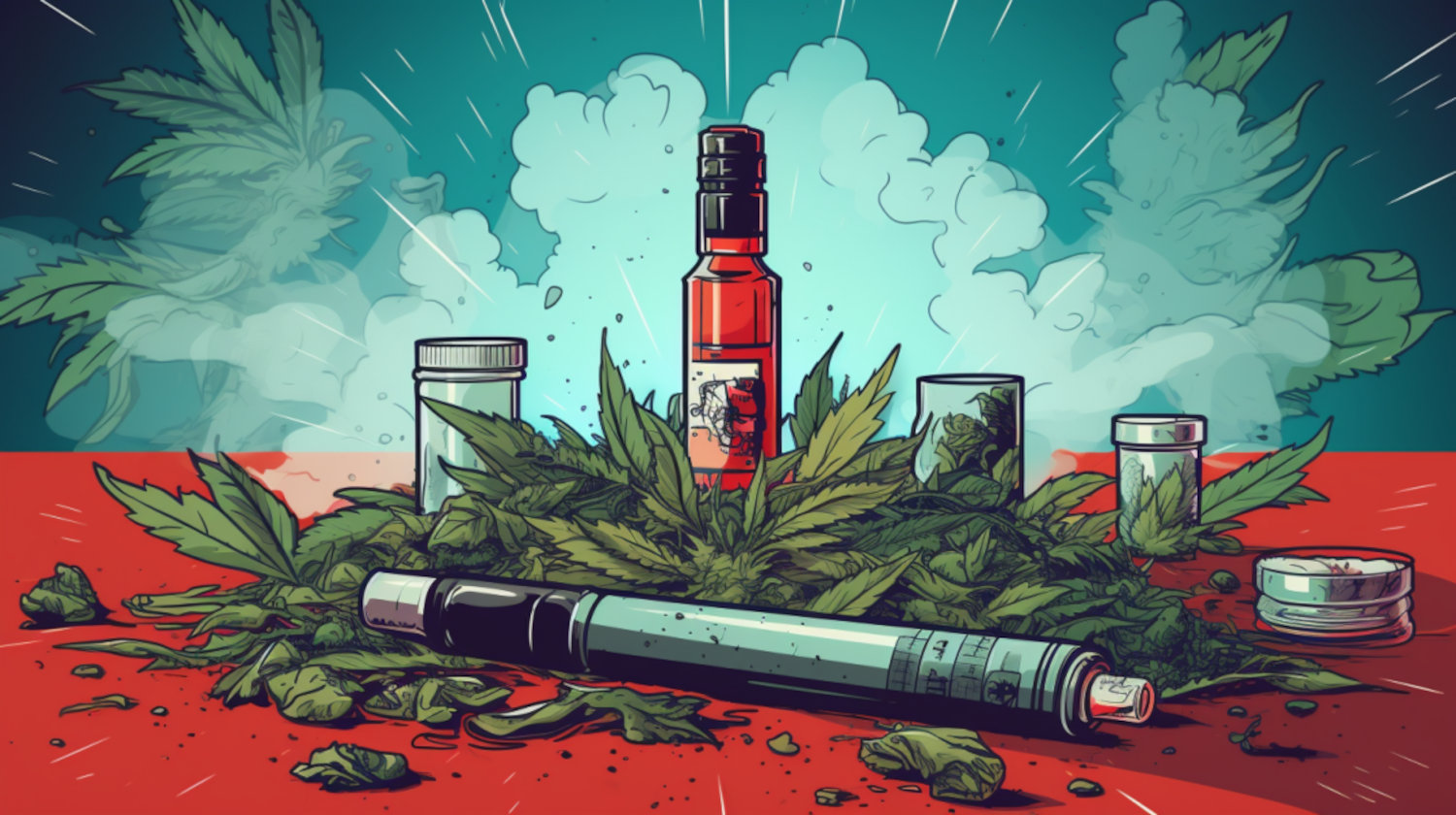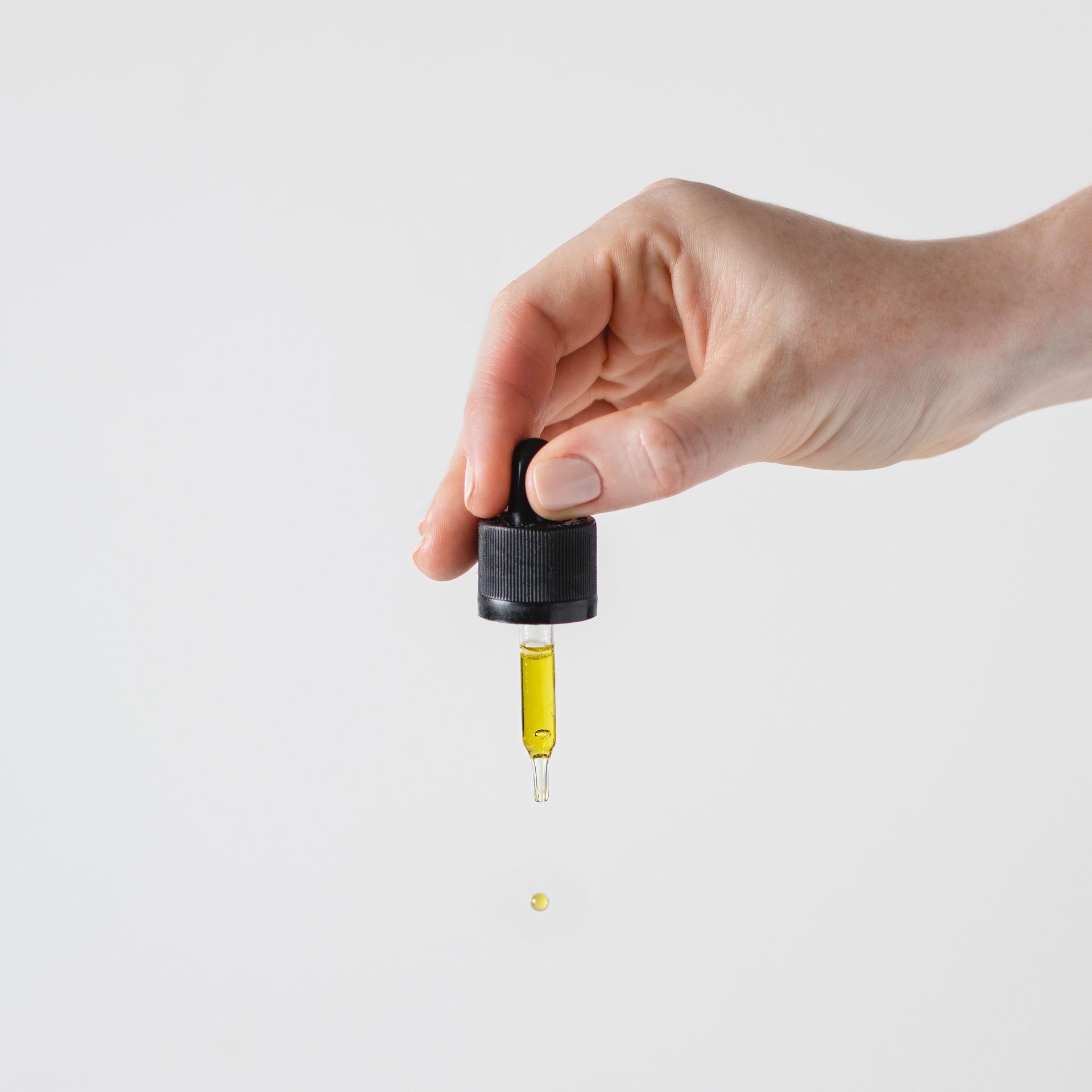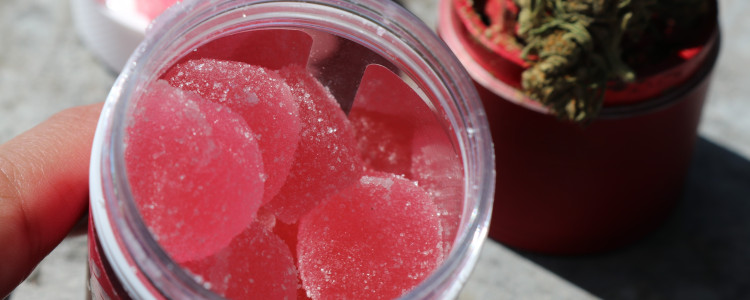Since the passing of the 2018 Farm Bill, the hemp industry has experienced an explosion of hemp-derived cannabinoids. These fascinating compounds have captured the attention of both researchers and cannabis enthusiasts alike. And among the vast array of cannabinoids, THC-O has emerged as a rising star.
THC-O, short for THC-O-acetate, is a synthetic cannabinoid that is not naturally found in the cannabis plant. THC-O-acetate is typically synthesized using delta-8 THC, but it can also be synthesized from delta-9 THC and delta-10 THC. However, THC-O-acetate, or THCOa, has garnered significant interest due to its potential potency, often being marketed as being between two and four times stronger than traditional THC.1 While scientific studies confirming this claim are currently limited, it remains a widely discussed topic in cannabis circles.
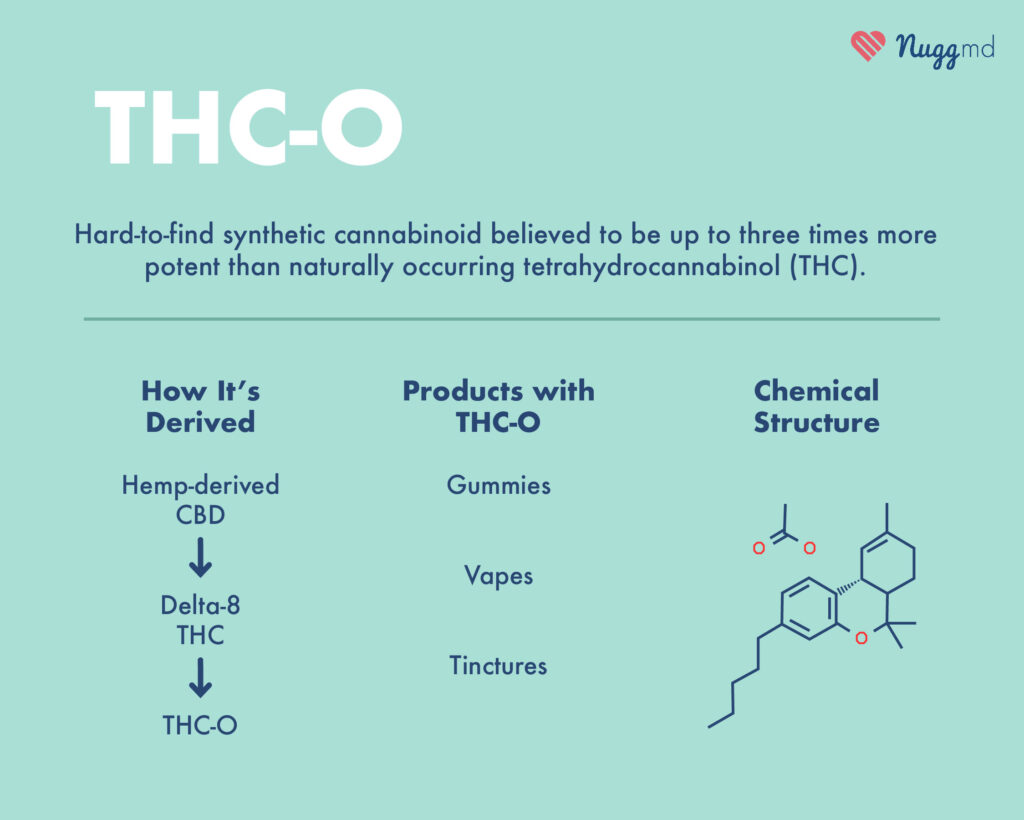
However, several studies report the significant dangers of inhaling THC-O and other cannabinoid acetates.2 Specifically, researchers called attention to THC-O's similarity to Vitamin-E acetate, responsible for a wave of vaping-related lung injuries in 2019-2020.3 Also, there was a documented case of a severe panic attack following the consumption of THC-O using an e-cigarette.4
Still, the cannabinoid remains a widespread curiosity for both consumers and scientists. And given the surge in interest in THC-O, it's natural that many people are wondering how it compares to other popular cannabinoids.
THC-O vs THC-P
THC-O and THC-P are two lesser-known cannabinoids that have both garnered attention for their potentially novel and powerful effects. THC-O is a synthetic cannabinoid not naturally found in the cannabis plant. On the other hand, THC-P, or tetrahydrocannabiphorol, is naturally occurring and was first isolated from cannabis in 2019.
Early studies have shown that THC-P exhibits cannabimimetic (mimics or produces effects similar to those of cannabinoids) activity similar to THC but may have 33 times more affinity for the CB1 receptor than delta-9 THC. This has many researchers speculating that the presence of THC-P in certain cannabis strains may account for their unique pharmacological properties that the presence of THC cannot solely explain.5
There have been many anecdotal reports that THC-P is significantly more potent than THC; more clinical research is needed to verify this claim. Similar claims have been made about THC-O, which has been marketed as being three times more potent than THC. Still, like with THC-P, scientific evidence supporting this claim is extremely limited.
While THC-O could offer a unique and potent high compared to THC-P, it has been reported to carry similar risks to Vitamin-E acetate when vaped. THC-P has no such similarity. Even so, there is limited research on the long-term effects and potential risks associated with high doses of either THC-P or THC-O.
THC-O vs Delta-8
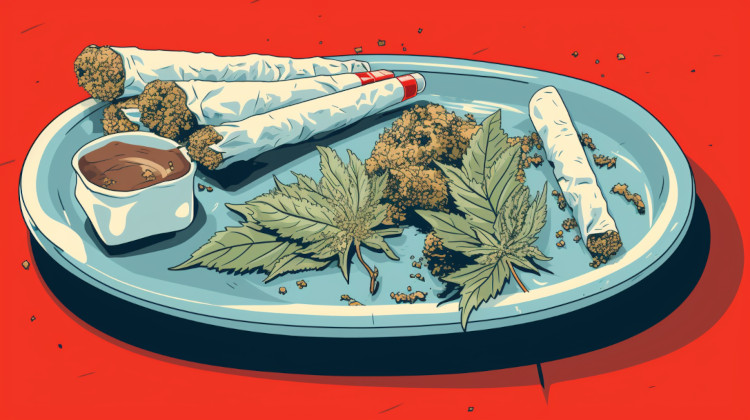
Delta-8 THC is a naturally occurring cannabinoid found in trace amounts in the cannabis plant and is considered to be a byproduct of delta-9 THC degradation.6 However, commercial delta-8 THC products are derived from cannabidiol (CBD), making these products "semi-synthetic" in nature. The process of extracting concentrated delta-8 THC typically involves converting CBD into delta-8 THC through various chemical reactions.7,8
Both THC-O and delta-8 THC are known to have intoxicating effects, similar to THC, the primary intoxicating compound in cannabis responsible for the "high" experienced by users. In fact, some studies have suggested that "Delta-8-THC may provide much of the experiential benefits of delta-9-THC with lesser adverse effects."
When it comes to potency, THC-O takes the cake over Delta-8. While THC-O has been reported to be 3x stronger than THC, delta-8 is about two-thirds as potent.9
However, this means that delta-8 could be best suited for those new to THC and cannabis more generally. Its calming and sedative effects are reminiscent of the calming sensations associated with indica strains. Delta-8 may offer a mild euphoria that can be enjoyed without the potentially overwhelming intensity of potent cannabinoids like THC-O, making it ideal for individuals seeking a more mellow experience.
Nevertheless, some have raised safety concerns over delta-8, notably the CDC and the FDA. The FDA, in particular, has made it clear that delta-8 products have neither been evaluated nor approved by the agency, and the CDC has issued warnings about the potential for adverse health effects when consuming products with delta-8.
Finally, it's important to consider that both delta-8 THC and THC-O fall under legal gray areas in some jurisdictions, which can limit the availability and regulation of these cannabinoids.
THC-O vs Delta-9
Delta-9-tetrahydrocannabinol is what we all commonly know as THC, the primary intoxicating compound found in cannabis, the most famous and sought-after of all cannabinoids.
Delta-9 THC is a naturally occurring cannabinoid and is often found in cannabis plants in high concentrations (sometimes up to 35% or more). While both are psychoactive compounds, each differs in their individual properties. Delta-9 THC is known for producing a range of effects, including altered perception, euphoria, and potential cognitive impairments.10
THC-O, on the other hand, has been described as "the spiritual cannabinoid," with some consumers claiming the potential to induce gentle visual hallucinations and generate an intense euphoria reminiscent of psychedelics.11 However, this evidence is limited, and other research indicates this is not the case.12
THC-O is reported to be significantly more potent than delta-9 THC, with frequent claims that its intoxicating effects are three times stronger. This increased potency may result in a more intense and long-lasting high. The onset times of THC-O and delta-9 may also vary, although the specific details require further investigation.
Heightened potency, distinct effects, and other unique properties may make THC-O appealing to individuals seeking a more intense and transcendent cannabis experience than is usual for typical THC. However, this same high potency and potential for hallucinogenic effects can pose risks for some users, requiring cautious consumption.
With delta-9 THC being the more widely studied and understood compound, it offers a range of effects that many cannabis users are deeply familiar with. The same cannot be said of THC-O. Ultimately, delta-9 provides an experience that can be enjoyable for recreational purposes. However, it can also lead to potential adverse effects, such as anxiety and temporary cognitive impairments, especially at high doses.
THC-O vs Delta-10

Delta-10 THC is another cannabinoid that closely resembles delta-9 THC in its molecular structure. It exhibits intoxicating properties that may induce a high, similar to its more traditional counterpart. However, delta-10 THC is sourced by converting CBD from legal hemp, making it legal in the eyes of the federal government. This often comes as a surprise, considering its potentially intoxicating effects. THC-O is not considered a legal hemp derivative because of its synthetic nature and does not enjoy the same legal status as delta-10.
So, many consumers who otherwise do not have access to cannabis products containing delta-9 THC or other cannabinoids turn to delta-10 for this reason. Nevertheless, a significant challenge arises from the lack of consumer awareness regarding the actual composition of delta-10 THC products.
Many people report that, while still intoxicating, delta-10 is considerably less potent than THC and THC-O. Some describe a mellow, gentle high with less potential for anxiety or paranoia compared to other cannabinoids. Yet, the reports vary (likely because many delta-10 products contain other cannabinoids alongside varying concentrations of delta-10). It's also worth noting that the Delta-10 is not approved by the FDA.
Currently, clinical studies documenting the short- or long-term effects of delta-10 THC or THC-O are lacking. Not only is research lacking on these cannabinoids, but the improper or unsafe synthesis of these cannabinoids could result in residual solvents or acids lingering in the final product. As a result, many experienced consumers prefer to stick to natural cannabinoids like delta-9 THC and CBD.
THC-O vs HHC
HHC, short for hexahydrocannabinol, is a modified form of THC resulting from hydrogenation. In other words, HHC can be synthesized by essentially treating THC like any other hydrogenated fat, involving the addition of a hydrogen atom to delta-9 THC or delta-8 THC.
Even though HHC is typically made in a lab, it is a naturally occurring cannabinoid, unlike THC-O. Given the similarities in their chemical structure, the effects of HHC closely resemble those induced by delta-9 THC, much more so than can be said of THC-O. However, this comes at the cost of being less potent than THC. That is, HHC is roughly as potent as THC, whereas THC-O is reportedly closer to 300% stronger.
While THC-O exhibits high psychoactivity and may stimulate the mind, HHC is reported to provide a more physical buzz that may leave one feeling calm and relaxed without being overly intoxicated.
The DEA considers HHC and its isomers to be Schedule 1 substances.
You may be wondering why chemists bother hydrogenating delta-9 THC. For the same reason, they hydrogenate anything else: to keep things fresher for longer. As such, HHC products tend to have the longest shelf-life compared to other cannabinoids. THC-O distillate typically lasts about six months or so (shorter than delta-9 products). However, that extra hydrogen gives HHC a much more stable chemical structure than THC-O and delta-9, allowing HHC products to last 2 years or more if stored well.
However, the latest research on HHC points out a large concern within the sale of HHC products. HHC exists in two forms when converted, (9R)-HHC and (9S)-HHC, with (9R)-HHC having similar binding affinity as THC to the CB1 receptor, but (9S)-HHC is much less active. HHC products sold on the market are made of a mix of these isomers, with the recent study finding that the HHC products analyzed contained between 15%-70% (9R)-HHC. These findings highlight the importance of analytical testing and consumer education for cannabinoids produced using chemical conversions.13
References
- Holt AK, Poklis JL, Peace MR. ∆8-THC, THC-O Acetates and CBD-di-O Acetate: Emerging Synthetic Cannabinoids Found in Commercially Sold Plant Material and Gummy Edibles. J Anal Toxicol. 2022;46(8):940-948. doi:10.1093/jat/bkac036 ↩︎
- Munger KR, Jensen RP, Strongin RM. Vaping Cannabinoid Acetates Leads to Ketene Formation. Chem Res Toxicol. 2022;35(7):1202-1205. doi:10.1021/acs.chemrestox.2c00170 ↩︎
- Benowitz NL, Havel C, Jacob P, O’Shea DF, Wu D, Fowles J. Vaping THC-O Acetate: Potential for Another EVALI Epidemic. Journal of Medical Toxicology: Official Journal of the American College of Medical Toxicology. 2023;19(1):37-39. doi:https://doi.org/10.1007/s13181-022-00921-3 ↩︎
- Sugawara N, Norio Yasui-Furukori, Shimoda K. A case of panic attack developing after THC‐O acetate inhalation using an e‐cigarette device. Published online May 4, 2023. doi:https://doi.org/10.1002/npr2.12345 ↩︎
- Citti C, Linciano P, Russo F, et al. A novel phytocannabinoid isolated from Cannabis sativa L. with an in vivo cannabimimetic activity higher than Δ9-tetrahydrocannabinol: Δ9-Tetrahydrocannabiphorol. Scientific Reports. 2019;9(1). doi:https://doi.org/10.1038/s41598-019-56785-1 ↩︎
- Hazekamp A, Fischedick JT, Díez ML, Lubbe A, Ruhaak RL. Chemistry of Cannabis. Comprehensive Natural Products II. 2010;3:1033-1084. doi:https://doi.org/10.1016/b978-008045382-8.00091-5 ↩︎
- Bernhard W, Heeb T, Tytgat J. Delta-8-Tetrahydrocannabinol, an emerging NPS and other structurally related cannabinoids. Toxicologie Analytique et Clinique. 2022;34(3):S174. doi:https://doi.org/10.1016/j.toxac.2022.06.300 ↩︎
- Golombek P, Müller M, Barthlott I, Sproll C, Lachenmeier DW. Conversion of Cannabidiol (CBD) into Psychotropic Cannabinoids Including Tetrahydrocannabinol (THC): A Controversy in the Scientific Literature. Toxics. 2020;8(2):41. doi:https://doi.org/10.3390/toxics8020041 ↩︎
- Kruger JS, Kruger DJ. Delta-8-THC: Delta-9-THC’s nicer younger sibling? Journal of Cannabis Research. 2022;4(1). doi:https://doi.org/10.1186/s42238-021-00115-8 ↩︎
- Martin-Santos R, Crippa JA, Batalla A, et al. Acute effects of a single, oral dose of d9-tetrahydrocannabinol (THC) and cannabidiol (CBD) administration in healthy volunteers. Current pharmaceutical design. 2012;18(32):4966-4979. doi:https://doi.org/10.2174/138161212802884780 ↩︎
- Kruger DJ, Amila K, Kaplan SM, et al. A Content Analysis of Social Media Discussions on THC-O-Acetate. Cannabis. 2023;6(2):13-21. Published 2023 Jul 5. doi:10.26828/cannabis/2023/000164 ↩︎
- Kruger DJ, Bone CC, Meacham MC, Klein C, Kruger JS. THC-O-Acetate: Scarce Evidence for a Psychedelic Cannabinoid [published online ahead of print, 2023 Jun 29]. J Psychoactive Drugs. 2023;1-5. doi:10.1080/02791072.2023.2230573 ↩︎
- Nasrallah DJ, Gaarg NK. Studies Pertaining to the Emerging Cannabinoid Hexahydrocannabinol (HHC). ACS Chemical Biology. Published online August 14, 2023. doi:https://doi.org/doi.org/10.1021/acschembio.3c00254 ↩︎
The information in this article and any included images or charts are for educational purposes only. This information is neither a substitute for, nor does it replace, professional legal advice or medical advice, diagnosis, or treatment. If you have any concerns or questions about laws, regulations, or your health, you should always consult with an attorney, physician or other licensed professional.

